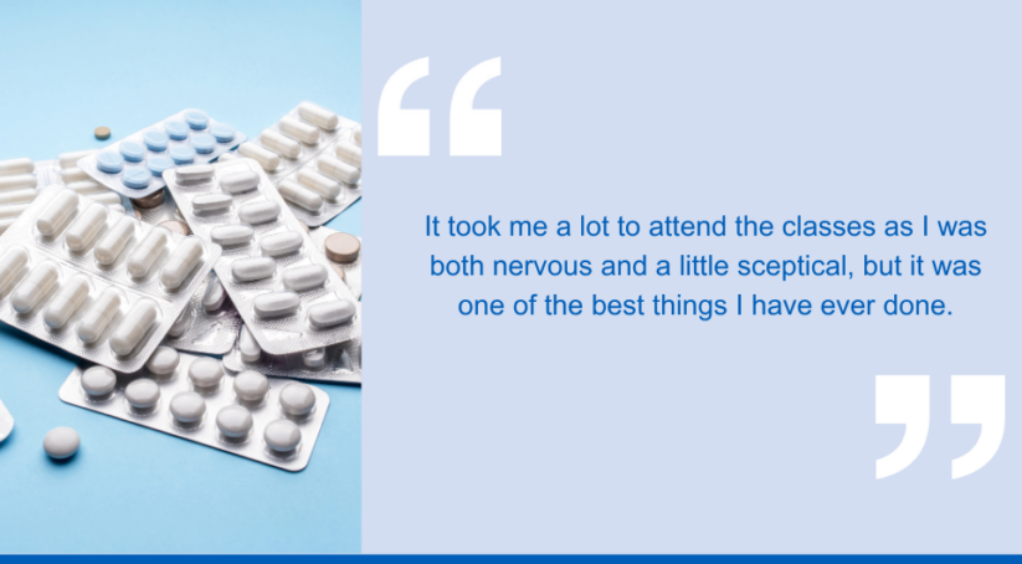“Sneezing pandas, psychotic cats and pain management”
Lorna has had over a decade of living with multiple conditions that cause a variety of serious pain responses.
She has learned to manage her pain better and successfully moved from taking regular high dose opioids every day to only occasionally needing over the counter pain medication.
Here she tells her story of how she overcame chronic pain, with the help of Live Well Derby, her health coach, her partner and psychotic cats.
“I was given a prescription for a cocktail of pain medication and was told this was it for the rest of my life.
“After a time they weren’t really making a difference, so other than going on even stronger opioids, I looked into other ways to help with the pain, finding some were actually more effective.
“Reading some articles about the dangers of some of the drugs I was taking, I decided to try and reduce my dosage. I tapered off slowly and I had lots of support from my partner.
“Once my dose was reduced, I began to see how much joy they had sucked out of my life and how depressed I was.
“At the time I blamed my low mood just on the pain – yes the pain was part of it and it still does cause low moods – but the high dose opioids were making it considerably worse.
“Another side effect of the medication was brain fog. Again this is one of the symptoms of my fibromyalgia but it drastically reduced when not taking the drugs on a regular basis. Sporadic use also actually makes them more effective for managing the pain.
“Once my head was a bit clearer, I plucked up the courage to join LiveWell Derby to help with weight management and to look at improving my mobility.
“I had a dedicated health coach who supported me, listened but still held me accountable – and also put me on the Escape Pain courses they ran.
“It took me a lot to attend the classes as I was both nervous and a little sceptical, but it was one of the best things I have ever done.
“It’s a mix of discussion on pain management techniques and physiotherapy type exercises in a small group of people who are also suffering.
“The thought of exercise and movement when you are in pain is terrifying and your instinct is not to move because you think it will make things worse and you are exhausted.
“Going to the gym was not an option because of my disabilities and generally feeling inadequate next to people who take for granted their ability to move.
“But in a small supported group where you are not alone and there is no expectation – you just do what you can – that makes all the difference.
“Attending the group not only took the fear of moving and exercise away but also opened my mind to its benefits – you need the strength in your muscles to support the areas where you have pain, as well as it reducing inflammation in the body and helping with low mood.
“Since joining the Joined Up Care Derbyshire pain management programme to offer my input as a lived experience participant I have also learned a lot about self-management from the Live Well With Pain website.
“I have also seen a lot of changes over the last decade to pain management both in the hospital and at my GP.
“I have had both some absolutely terrible experiences and some positive ones.
“Mostly the difference is in how the medical professional at whatever level listened to me and whether they believed me or patronised me – thinking they knew more about my pain than I did.
“If there’s any advice I would like to offer to healthcare professionals it is that they should listen to their patient and work with them to find techniques that work for that individual.
“How you speak to that patient also makes a big difference.
“Do not minimize their fear, low mood or the general wear and tear living with pain has on their mental health and do not try to give them advice on pacing when their pain is most acute (yes that actually happened to me. I wasn’t at my most receptive to these techniques when I had a raging bile duct infection – yet the lecture was delivered to me.)
“To other people who are living with pain I would say there are a lot of improvements now in how pain is managed.
“I know it’s hard when you are in continual agony to think about things clearly but try to keep an open mind on ways to live with your pain and manage it so it doesn’t control your life as much.
“Be open to things that may be scary or just seem stupid – you don’t know until you try it.
“Find people to talk to who are in your position. Opioids are not the only answer.
“So where do the sneezing pandas and psychotic cats come in?
“I have numerous techniques I use to manage my pain – from nutrition, physio exercises, breathing techniques, to pacing and diversion.
“Diverting my brain from thinking about the pain helps me stop it screaming at me to just being a bit of a buzz in my ear.
“Yours could be monster trucks, knitting, repairing an engine, or videos of sneezing pandas – one of mine is psychotic cats.
“It helps to distract me from the stress that the pain causes so I can focus on managing the pain itself.”

